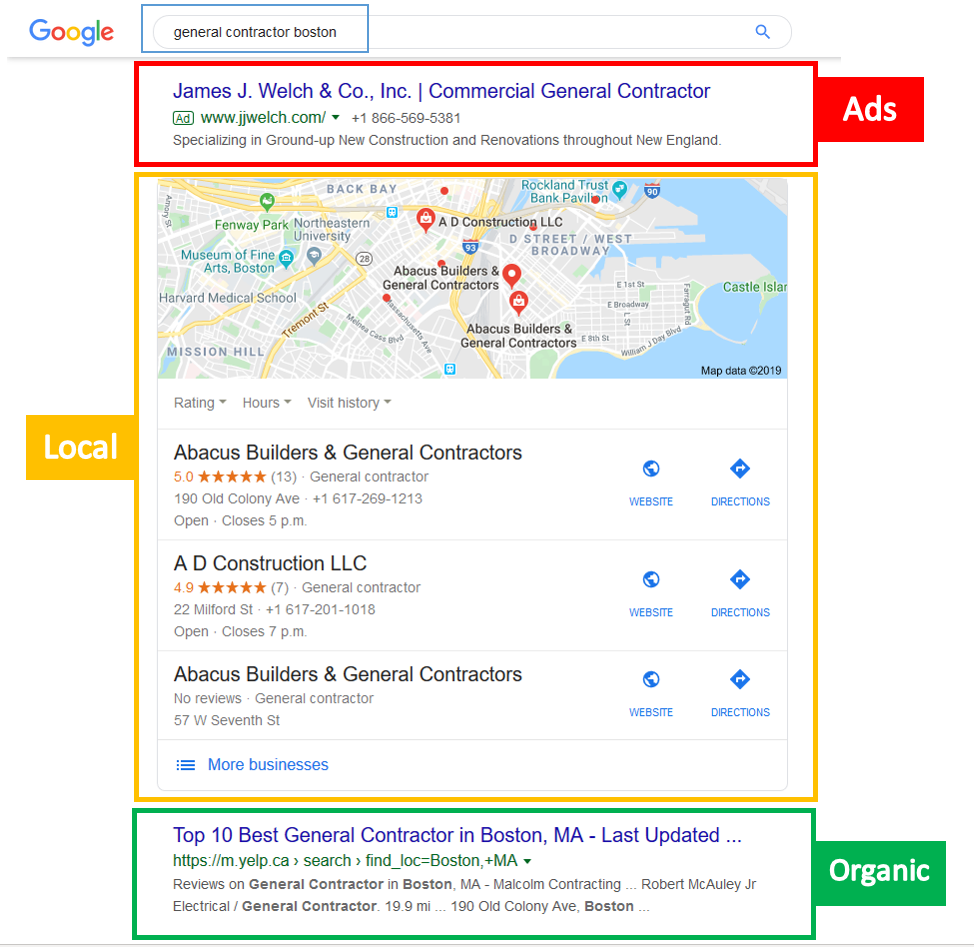
If you’ve been looking to do more than merely show up in Google’s search results, then you need to read this article.
In this blog post, we’re going to show you how to dominate Google. We'll start from the ground-up so you understand Google's front-page results, how they work, and how you can appear at the top.
Ready to make Google work for you? Let’s get started.
Google’s Front-Page Results: A Breakdown
The first thing you need to understand is how the search results appear on the page. In general, they are broken down into three different sections:
- The local search pack
- The organic search results
- Google Ads (aka, pay-per-click ads, and formerly known as AdWords)
Here, a visual reference might prove useful so that you have an idea of what these categories look like. Let’s try typing general contractor boston into Google to see how the search results are categorized:

And presto! You’ll see the three categories displayed right there in the search results.
- ● Google Ads appear at the top.
- ● Directly below them, you’ll see the local pack.
- ● And below that are the organic search results. These are what we’d consider the “typical” results when we enter a search term in Google.
Note that there are other types of results. Knowledge graphs, travel packs, People-Also-Ask, featured snippets—the list goes on. And it will likely continue to expand as Google evolves. But for most business owners and service providers, the Big Three above are the only ones to worry about. At least for the time being.
So, to dominate Google, we need a comprehensive strategy that gets us to the top of all three categories. Let’s start with local.
1. The Local Pack
As the name suggests, the local pack is all about displaying local businesses. It’s designed to streamline the search experience so that users who are on the go can find the service provider they’re looking for. (Hence the map: Users can get directions straight to the place in question.)
You’ll notice that the local pack consists of a map of the area and three business listings, each with a pin on the map. This number can vary based on location, but three listings is the most common.
Getting into the local pack is most important for establishments like restaurants, bars, and retailers—places that depend on foot traffic to earn sales. That said, virtually any small business will benefit from a spot on the map. After all, it’s the first thing a user sees after the sponsored ads. That’s a prime piece of real estate for any company that does face-to-face business.
How to Dominate Local
- Set up a Google My Business
- Register your service area on Google Maps (still possible even if you don’t have a physical business location).
- Build citations through business directories. If a lot of your information on the Internet is out-of-date or incorrect, you may need to invest in a NAP clean-up.
…And most important…
- Reviews, reviews, reviews! Ask your clients for reviews, respond to reviews on your page. Reviews are the best lead-generating tool you have, and they cost you absolutely nothing.
Getting user reviews for your website is one of the oldest tricks in the SEO book. You can have one of the best websites among all competitors in your industry, but if you don't have enough customer reviews, your competition will outrank you, especially in the local pack. Following this basic rule will help optimize your Google ranking, which is what every website needs to rank on page 1 of the search results.
Keep in mind that Google values all reviews, not just the positive ones. When you have a healthy combination of positive and negative reviews posted regularly, Google considers this much more organic and trustworthy. So, get as many reviews as you can and always manage the negative ones by responding promptly and professionally.
2. The Organic Search Results
When people are thinking of Google’s search results, they’re usually thinking of the organic search results. This is the lion’s share of the search results, consisting of page after page from millions of websites.
It’s easy to appear in the organic section. Your webpages will naturally (organically) appear once Google has indexed your website.
But you don’t merely want to appear in the search results. It’s no use if you’re on the fourth or fifth page. What you want is to be right at the top of the organic results, on the front page of Google. That’s what’s going to drive business to your door.
How to Dominate Organic
Dominating organic is all about one thing: content creation. You need to be creating original content that your users need, want, and can easily digest.
Organic marketing includes:
- ● Search-engine optimized (SEO) landing pages
- ● Engaging blog posts
- ● Building your reputation through backlinks
Also important is optimizing the technical specs of your site. Make sure that your page loading times are short, your site is mobile-friendly, and your HTML site map is clear and consistent.
Tips to Dominate Organic:
- Add your webpage's main keyword to your H1 header and sprinkle it throughout the content, including H2 headers. (But avoid overusing keywords such that the language feels unnatural.)
- Bigger is better. When creating content, choose comprehensiveness over conciseness.
- Seek high-quality backlinks through link-building campaigns.
Organic takes time and effort. It’s not a quick fix for a business in dire straits. You won’t see results overnight, and you shouldn’t expect to, either.
Nor is organic a guaranteed return on your investment. So many factors go into it that it’s never so cut-and-dry as: spend X amount of dollars and climb Y number of spots. Your competitors are probably pumping the same amount of money—if not more—into their organic marketing. Your success depends just as much on what you do as what your competition does. Nevertheless, over time, if you invest in your organic marketing, you will see results.
Invest energy. Trust the process. Get leads.
3. The Google Ad (Pay-Per-Click) Results
Google Ads is a straightforward investment with a clear-cut value proposition: Pay Google money, and they’ll put your website at the top of their search results.
There’s a bit more to it than that, of course. Google Ads works on an auction-based system, where companies bid on keywords they’d like to show up for. You set your keywords, the time you want your ads to run, and a monthly budget. Every time you get a click or a phone call from your ad, Google pulls a pre-determined amount from your monthly budget.
Google Ads is not for every business. It can be expensive, but for contractors—where every lead matters—it’s a no-brainer. Who knows? That one lead may cost a few bucks, but it could turn into a months-long construction project.
How to Dominate Google Ads
- Set up a campaign with Google.
- Narrow down your keywords and service area.
- Create engaging ads.
- Follow your metrics and conversions. That way, you can see what’s working and what isn’t.
The evidence suggests that Google Ads will become more and more essential to online marketing. Already, Google is looking for new ways to diversify its sponsored ads, with new features like Google Guarantee. And with many more on the horizon, it looks like this is only the beginning.
Be sure to catch on before it’s too late. If you need help setting up an Ads campaign, don’t hesitate to give us a shout!
5 Key Takeaways for a Killer Marketing Strategy
- Dominating Google requires a comprehensive strategy that targets local, organic, and sponsored search results.
- Maintain a strong online presence with your Google My Business listing.
- Get reviews.
- Create high-quality content that people want to read.
- Pay Google to put your ads at the top.
Google is one of those things that we think we understand until we need to use it to get better results for our website. At which point, we realize there's a lot more that goes into dominating Google rankings than we thought. It's basically an enigma, thanks to its ever-changing algorithm updates!
But that's why we're here. We gathered a few handy tips to help you navigate Google's recent updates to improve your website’s overall rating in 2022.
So, to sum this up, for your website to rank high in authority and SERPs, you need to stay on top of SEO best practices. Even the slightest change to their algorithm can have a significant impact causing your site to be deranked. Therefore, you need to keep yourself updated.
Takeaways and Final Thoughts
Staying on top of Google algorithm changes is required for anyone who runs their own website and cares about ranking. If you're mindful of SEO best practices, it makes dominating Google a lot easier. So long as your on-page SEO aligns with Google guidelines, you will be solid!
And now for a quick recap. Always follow changes and updates to the following areas:
1) Adding appropriate keywords in your article and using LSI keywords to help boost rankings
2) Create long-form quality content without adding the fluff
3) Follow SEO best practices to increase your chances of getting backlinks from reputable and authoritative sites.
4) Reviews, reviews, reviews! Google loves reviews, but what they don't love is manufactured reviews. Invite every customer to leave a review and always manage the negative ones by responding.
Ready to Crush the Competition? LinkNow Media’s Here to Help!
With over 10,000 active clients, LinkNow Media has brought a revolution to the digital marketing industry. We provide the most cost-effective marketing solutions available in North America. Business owners, this is your chance to dominate Google and crush your competition.
If you want to harness the power of local, organic, and Google Ad search results, consider us your first point of contact. Reach out to us by email at website@linknowmedia.com, by phone at 1-888-667-7186, or by leaving a comment below!

